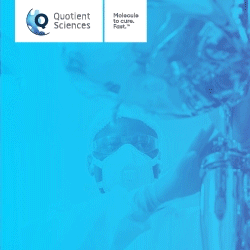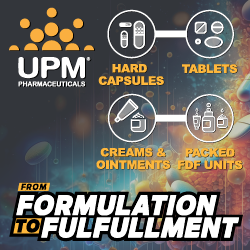Fulcrum Therapeutics Announces Phase 3 Clinical Trial
Fulcrum Therapeutics, Inc. recently announced its plans to initiate REACH, a Phase 3 clinical trial of losmapimod in people with facioscapulohumeral muscular dystrophy (FSHD), in the second quarter of 2022. FSHD is a serious, rare, progressive and debilitating disease for which there are no approved treatments. It is characterized by fat infiltration of skeletal muscle leading to muscular atrophy involving the face, scapula and shoulders, upper arms, and abdomen. Impact on patients includes profound decreases in the ability to perform activities of daily living, loss of upper limb function, loss of mobility and independence, and chronic pain.
“We are excited to advance losmapimod into the REACH Phase 3 trial for FSHD,” said Bryan Stuart, Fulcrum’s President and Chief Executive Officer. “Results from the Phase 2b clinical trial demonstrated that losmapimod slowed disease progression and improved function in people with FSHD. Based on these data as well as insights gained from the trial on optimal measures of disease progression, we aligned with regulators, including the FDA, on key aspects of the design of the REACH trial. With positive data, we expect REACH to be the basis for approval. This marks a significant milestone for FSHD patients and caregivers, and Fulcrum remains committed to serving the FSHD community.”
“There are no approved therapies for FSHD, and there is a clear and urgent need for a treatment to slow or stop disease progression,” said Nicholas Johnson, MD, MSci, FAAN, Associate Professor, Division Chief of Neuromuscular, and Vice Chair of Research in the Department of Neurology at Virginia Commonwealth University. “For people with FSHD, every day without a treatment is another day that they may lose strength, the ability to lift their arms, or walk unassisted. Losmapimod is the first and only investigational medicine in clinical development. The data to date are very promising, showing meaningful clinical benefit and a well-established safety and tolerability profile. I look forward to further investigating losmapimod in the REACH trial.”
Based on results from a Phase 2b study of losmapimod showing clinical benefit, Fulcrum engaged with US and EU regulatory agencies, including the US FDA, and gained alignment on key aspects of the design for a Phase 3 trial. REACH will be a randomized, double-blind, placebo-controlled, multi-national trial to evaluate the efficacy and safety of losmapimod for the treatment of FSHD. The trial is expected to enroll approximately 230 adults with FSHD. Patients will be randomized 1:1 to receive either losmapimod, administered orally as a 15 mg tablet twice a day, or placebo, and evaluated over a 48-week treatment period. The primary endpoint of the study is the absolute change from baseline in Reachable Workspace (RWS). Secondary endpoints include muscle fat infiltration (MFI), Patient Global Impression of Change (PGIC), and Quality of Life in Neurological Disorders of the upper extremity (Neuro QoL UE). REACH will also include patient-centered assessments of healthcare utilization.
Judith A. Dunn, PhD, Fulcrum’s President of Research and Development, said “We learned from our Phase 2b trial that RWS, MFI and patient-reported outcomes are reliable measures of disease progression and that we can observe meaningful differences in these endpoints compared to placebo after just 48 weeks of treatment with losmapimod. REACH is optimized to demonstrate similar statistically and clinically significant benefits and represents an important step in delivering a life-changing therapy to people with FSHD.”
Results from ReDUX4, a randomized, double-blind, placebo-controlled Phase 2b trial, which enrolled approximately 80 patients treated for 48 weeks, demonstrated clinically relevant benefits on multiple measures of muscle health and function as well as patient-reported outcomes. Notably, losmapimod improved accessible surface area in RWS, a quantitative measure of upper extremity range of motion and function that has shown to correlate with the ability to independently perform activities of daily living. Losmapimod also decreased progression of fat infiltration in muscles already affected by disease and preserved the health of normal-appearing muscles. Additionally, losmapimod-treated patients reported feeling better compared to those on placebo using the assessment. Consistent with losmapimod’s extensive safety and tolerability profile from clinical trials outside of FSHD, there were no serious treatment-related adverse events observed in the Phase 2b trial.
FSHD is a serious, rare, progressive and debilitating disease for which there are no approved treatments. It is characterized by fat infiltration of skeletal muscle leading to muscular atrophy involving primarily the face, scapula and shoulders, upper arms, and abdomen. Impact on patients includes profound decreases in the ability to perform activities of daily living, loss of upper limb function, loss of mobility and independence and chronic pain. FSHD is one of the most common forms of muscular dystrophy and has an estimated patient population of 16,000 to 38,000 in the US alone.
RWS is a quantitative measure of upper extremity range of motion and function. Specifically, it evaluates total shoulder and proximal arm mobility by utilizing 3D motion sensor technology. Preserving function, as assessed by RWS, is critical for maintaining abilities for self-care and other activities of daily living that directly influence quality of life. Based on published results, reachable workspace is an important measure of independence.
Losmapimod is an investigational, selective p38α/β mitogen activated protein kinase (MAPK) inhibitor. Fulcrum exclusively in-licensed losmapimod from GSK following Fulcrum’s discovery of the role of p38α/β inhibitors in the reduction of DUX4 expression and an extensive review of known compounds. Results reported from the ReDUX4 trial demonstrated slowed disease progression and improved function, including positive impacts on upper extremity strength, supporting losmapimod’s potential to be a transformative therapy for the treatment of FSHD. Although losmapimod had never previously been explored in muscular dystrophies, it had been evaluated in more than 3,500 subjects in clinical trials across multiple other indications, with no safety signals attributed to losmapimod. Losmapimod has been granted U.S. Food and Drug Administration (FDA) Fast Track designation and Orphan Drug Designation for the treatment of FSHD.
Fulcrum Therapeutics is a clinical-stage biopharmaceutical company focused on improving the lives of patients with genetically defined rare diseases in areas of high unmet medical need. Fulcrum’s two lead programs in clinical development are losmapimod, a small molecule for the treatment of facioscapulohumeral muscular dystrophy (FSHD) and FTX-6058, a small molecule designed to increase expression of fetal hemoglobin for the treatment of sickle cell disease and other hemoglobinopathies, including beta-thalassemia. The company’s proprietary product engine, FulcrumSeek, identifies drug targets that can modulate gene expression to treat the known root cause of gene mis-expression. For more information, visit www.fulcrumtx.com.
Total Page Views: 1455












